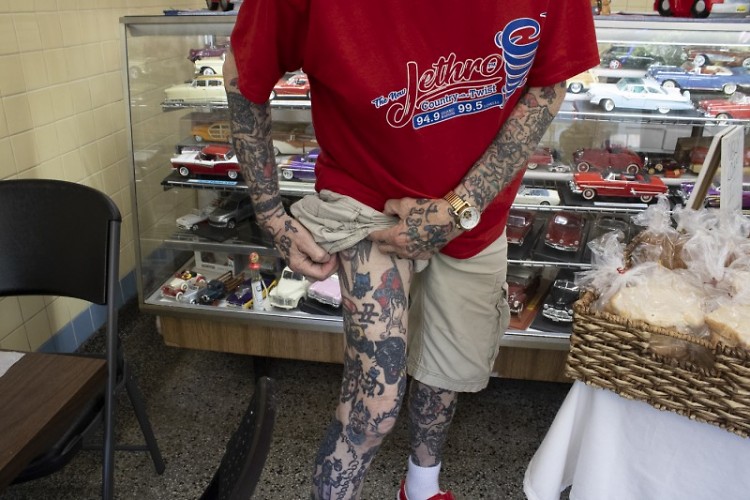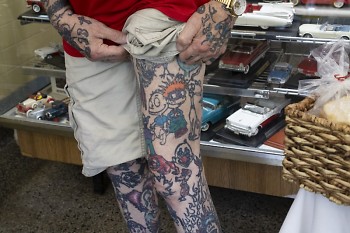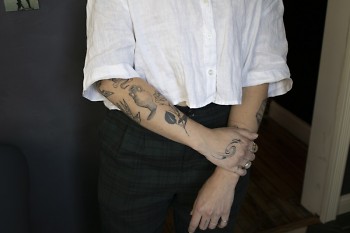Teryl Grooters never wanted a tattoo, that is, until he turned 60.
While working at Vito's pizza on the west side of Grand Rapids, Grooters decided one day to visit the tattoo shop across the street and get a bulldog tattooed on his arm to commemorate his time at Grandville High School. Despite being a novel experience for the Jenison resident, now known to some as “Tattoo Terry,” one tattoo just wasn’t enough.
Grooters went back the very next day to get the Red Dog Beer mascot tattooed on his other arm. Over the next five years, Grooters went on to receive a total of 356 tattoos.
Most of Grooters’ inspiration has come from comic book and cartoon characters, along with tattoos of his kids' initials and other things he enjoys.
While not many of us will celebrate the 300th tattoo milestone like Grooters has, an increasing number of Americans have made the decision to get their first tattoo in recent years. A study conducted by the Pew Research Center in August 2023 found that about 32% of Americans have at least one tattoo, with nearly half of respondents ages 30-49 falling in that category.
“People told me that they look awful when you get old and your skin gets all baggy,” Grooters said. “But they don't look awful yet.”
Although increasingly more popular, tattoos are not a new phenomena to Grand Rapids and have a storied local history.
Back in 1914, with nothing more than $12 in his pocket, Netherland native Egbertus Jan Berghege came to GR from Canada in search of a better life, according to research by tattoo historian Derin Bay.
Once here, Berghege, known as “Dutch,” joined the circus – namely, the Zeidman and Pollie Shows, which were headquartered in Grand Rapids and traveled across the country as part of a traveling carnival circuit in the early 1900s.
During this era, a circus attraction that gathered many viewers was “The Tattooed Man.” While Berghege was never the designated tattooed man, postcards featuring him covered in tattoos from the neck down were sold and have kept tattooed enthusiasts talking for decades.
Since the days of Pollie shows and carnival attractions, tattoos have been given a new life as a form of self expression.
Vanessa DeCouto, the owner of a private tattoo studio located in the Creston neighborhood, began tattooing by hand-poking around seven years ago before getting her start in blackwork tattoos. Her shop, From Mars Tattoo Studio, which opened to the public in May, is located in the back of two local shops: a vintage shop, Retro Sun, and a plant shop, The Natural Order.
During her time in the industry, DeCouto has noticed many changes, including the reasons why people decide to get tattoos.
“I think a lot of different types of people are getting tattooed now,” DeCouto said. ”People are realizing they can have their own reason for getting a tattoo and it doesn't have to fall into some category.”
With 146 tattoo shops in the Metropolitan area of Grand Rapids, you would be hard pressed to walk down Bridge Street in the summertime and without seeing number of people adorned in permanent ink.
The increase in popularity has seemingly come with an increase in acceptance.
Grooters shared that he has had people judge him based off of his appearance, but when they get to know the man behind the tattoos, their judgments shifted.
“She was kind of a little bit leery of me when she saw me,” Grooters reminisced about an old friend as he sat at a small table inside Van's Pastry Shoppe, a beloved hangout spot for Grand Rapids residents. “Because she didn't know me, and a lot of people make statements without thinking… But after she got used to [my tattoos], she didn't see them any more.People look at you, but then they change their mind about you.”
Nearly two decades have passed since Grooters got his last tattoo. Now 84 years old, he is happy with how his tattoos have aged, and when asked if he regrets them he instantly responds with no.
“People told me that they look awful when you get old and your skin gets all baggy,” he said. “But they don't look awful yet.”
For folks looking to begin their own tattoo journey, DeCouto emphasized that one of the most important things you can do is advocate for yourself.
“Knowing that you can advocate for yourself and you are a human with an autonomous body going through this experience, and if you don't like a design you don't have to get it,” DeCouto said.
The Rapidian, a program of the 501(c)3 nonprofit Community Media Center, relies on the community’s support to help cover the cost of training reporters and publishing content.
We need your help.
If each of our readers and content creators who values this community platform help support its creation and maintenance, The Rapidian can continue to educate and facilitate a conversation around issues for years to come.
Please support The Rapidian and make a contribution today.


